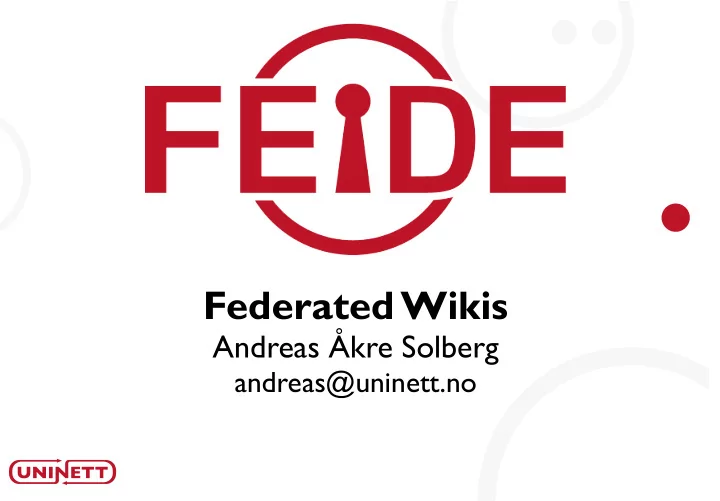

Federated Wikis Andreas Åkre Solberg andreas@uninett.no
Wikis in the beginning ...in the beginning wikis were wide open. Great ! - But then the spammers arrived.
Password protected wikis Create yet another account , with yet another password. And registrations is open, so basicly anyone can register and anonymously terrorize the wiki.
Introducing... Federated wikis
Why? Federated wikis: - does not require registration (convenient for user) - works with Single-Sign-On (convenient for user) - Can be anonymous, but trackable! Wiki admin sets the degree of anonymity. - Can use trusted attributes to perform access control!
Software used - Dokuwiki http://wiki.splitbrain.org/wiki:dokuwiki - simpleSAMLphp http://rnd.feide.no/simplesamlphp
Dokuwiki Pluggable authentication modules Supports ACL lists, and is using groups for authorization.
simpleSAMLphp A native full PHP5 implementation of a SAML 2.0 SP . Extremely simple installation and configuration. - Install (drop the folder) - Configure (setup SAML 2.0 metadata) - Test the examples, and run it with your application. BTW : It also supports SAML 2.0 IdP , Shibboleth 1.3 SP , Shibboleth 1.3 IdP , bridging, Radius/LDAP/SQL backends, OpenID Provider, OpenID bridging, eduGAIN ++.
simpleSAMLphp configuration SAML 2.0 IdP: Feide SAML 2.0 SP: Meta data for the wiki OpenSSO meta data is in a simple format, less verbose than standard SAML 2.0 meta data format. Most inportantly: endpoints urls, entity id and cert.-info.
Implementing an authentication module A dokuwiki authentication module identifies whether the user is logged in or not and returns either true or false . If true it accociates the authenticated user with a list of groups the user is member of, and also sets a username and a mail address.
Implementing an authentication module In the DokuWiki auth module , load simpleSAMLphp If session is not valid, then redirect to simpleSAMLphp for initializating a SAML 2.0 Authentication Request
Implementing an authentication module Next, user returns to the same page (remember the RelayState parameter), but is not catched by the if (not authenticated) section. Now we know the user is authenticated . We set user ID and mail attribute.
Dynamic group membership We generates some dynamic groups based on SAML 2.0 attributes: Resulting group membership for andreas@uninett.no: - orgXuninettXno - affiliationXemployeeXuninettXno - affiliationXmemberXuninettXno - orgunitXouXSUXouXTAXouXUNINETTXouXorganizationXdcXuninettXdcXnoXuninettXno
Custom groups Sometimes you have local groups at a service, that can not be generated dynamically from attributes at the IdP , right? Let's make a custom groups file ( conf/customgroups.php ): And load the custom groups of the user into the Dokuwiki auth module:
Returning from the auth module After retrieving attributes and dynamic group membership generation, we set name, mail and groups readable for dokuwiki internals and return true .
Access Control List We configure access control of the wiki, using the dynamic groups. The auth module requires no local users at the wiki to map against. But optionally users can be configured custom group membership in a separate file.
Login sequence simpleSAMLphp dokuwiki.php Feide SSOinit.php S A M L 2 . 0 A u t h R e q AssertionConsu SAML 2.0 AuthResponse IdP merService.php SLOinit.php SingleLogoutSe PHP rvice .php Session Storage
Logout sequence simpleSAMLphp dokuwiki.php Feide SSOinit.php AssertionConsu IdP merService.php SAML 2.0 LogouthReq e s n o p s e SLOinit.php R t u o g o L 0 . 2 L M A S SingleLogoutSe PHP rvice .php Session Storage
Feide IdP GÉANT2 IdP using using simpleSAMLphp Sun Access Manager SAML 2.0 Shib13 Feide eduGAIN Remote Bridging Feide Demowiki SWITCH Test AAI SAML 2.0 Shib13 Element (using simpleSAMLphp) Shibboleth 1.3 IdP using simpleSAMLphp Shib13 PAPI eduGAIN Home Bridging PAPI IdP PAPI Element
Feide RnD Read more about other projects http://rnd.feide.no (feel free to subscribe to the RSS)
?
Recommend
More recommend